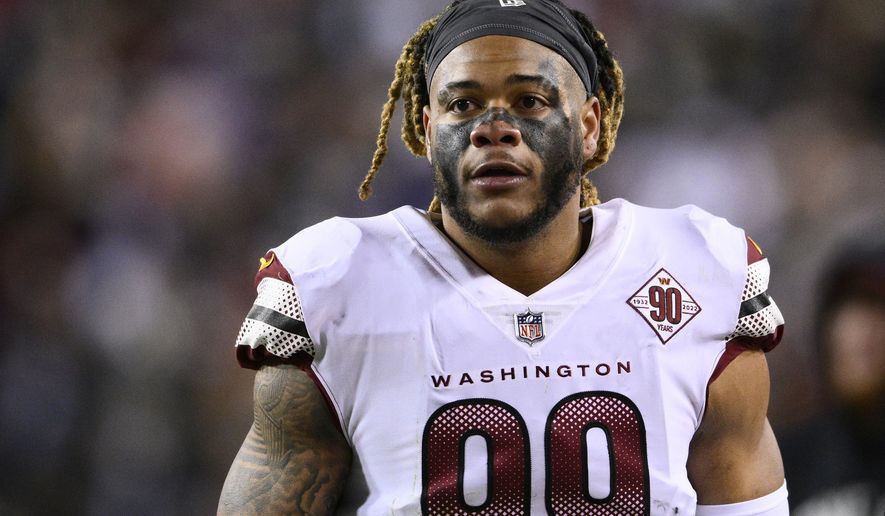Chase Young was Omega Theta Pi fraternity material. He was the Big Man on Campus at Ohio State. He was the No. 2 selection in the 2020 NFL draft, the first pick Commanders coach Ron Rivera made in Washington. Young was the league’s Defensive Rookie of the Year and appeared to be a game-changer at defensive end.
Now, though, with Rivera’s decision to decline to pick up Young’s fifth-year contract option, he has put Young on the rejects couch, with Jugdish, Sidney and Clayton. Help yourself to cookies and punch, Chase.
“Animal House” too harsh? Here, according to Washington Times reporter Matthew Paras, are some of the players who have been a top-five draft pick and had their fifth-year options declined: Celin Ferrell, Solomon Thomas, Mitch Trubisky, Dante Fowler, Greg Robinson and Luke Joekel, among others.
Not exactly a corner in Canton, is it?
Now Young gets to appear in a new game show. In 2021, during his Chase Young Celebrity Tour, he appeared on Celebrity Family Feud night. Now he will be a contestant in the Play to Pay Show this fall.
Simple rules — you play, you get paid. And by play, we know it means play worthy of your place when you entered the league as a celebrated rookie — not the disappointing follow-up season when Young had just 1½ sacks in nine games before the devastating knee injury that certainly complicate the decision about whether or not to invest in this young man.
It’s hard to separate the questions about the damage from the questions about the dedication.
Young came back from the torn right knee ligament and ruptured patellar tendon he suffered in the Nov. 14, 2021, game against Tampa to appear in three games at the end of last season. He had five tackles, one quarterback hit and appeared to move well during games.
Because of that, it would seem reasonable, that the team, rather than pay him $18 million for a fifth year next season, wants to see how he performs physically. He would become a free agent in 2024, but the team would still have the option to franchise tag him and negotiate a long-term deal.
But this is the highest draft pick this franchise has made since Robert Griffin III in 2012 (this organization has a knack for turning studs into duds), and to raise this red flag on Rivera’s signature personnel decision, even with the injury issues, makes the coach look bad. Not that he has needed any help with that.
After giving defensive tackle Jonathan Allen a four-year, $72 million contract extension in 2021 and then paying his fellow DT Daron Payne a four-year $90 million extension last year, a big investment in Young would be a lot of money tied up on the defensive line. Plus there is the complication of defensive tackle Montez Sweat, who has played in every game in three of his four seasons with Washington and had a strong year last season, with eight sacks and 28 quarterback hits. Today, Sweat, who can become a free agent at the end of this season, seems like the better investment.
Young was the first player chosen by Rivera, who was hired in December 2019 to run a coach-centric football personnel operation. Only Cincinnati quarterback Joe Burrow was selected ahead of Young.
The Ohio State All-American appeared to make Rivera a smart man in his rookie year, with 71/2 sacks, 12 quarterback hits and 44 tackles in 15 games. He was named the NFL Defensive Rookie of the Year.
Then came the offseason, and the commercial tapings and shows and the celebration of Chase. He didn’t include his teammates in that celebration, passing on taking part in voluntary OTAs that nearly all of his teammates posted for.
That’s when the questions about Young’s commitment surfaced, and he only validated them with his mediocre 2021 season.
So here we are, with the lame-duck Commanders staff, conducting business until the new owner is approved by the league and in place, raising the biggest commitment question of all by passing on the option of securing Young from free agency next season.
On radio row during Super Bowl, Rivera basically said he wanted to see if Young was committed to play for the money, comparing it to not picking up Payne’s fifth-year option last season. That paid off for everyone, as Payne had a career year, with 111/2 sacks and 18 tackles for losses.
“If you look at what Daron did, why wouldn’t you think of it that way?” Rivera said. “Believe me, that would be my approach, especially looking at what Daron did and the situation he put himself in. … It cost us [with Daron]. But it cost us in a good way, because the young man played; he did things the right way.”
He did things the right way.
This is about so much more than Young’s health. Personnel bosses in sports do not abandon the players they themselves selected so easily, even with an injury. They feel, rightfully so, that their reputations are at stake.
This is about something else.
When St. Louis Cardinal manager Johnny Keane was asked by a reporter why, after Bob Gibson pitched the complete nine-inning Game 7 clinching win over the New York Yankees in 1964 — after just two days rest and coming off a 10-inning complete game — Keane answered, “I had a commitment to his heart.”
Ron Rivera doesn’t have that kind of commitment these days to Young.
You can hear Thom Loverro on The Kevin Sheehan Show podcast.
• Thom Loverro can be reached at tloverro@washingtontimes.com.




Please read our comment policy before commenting.